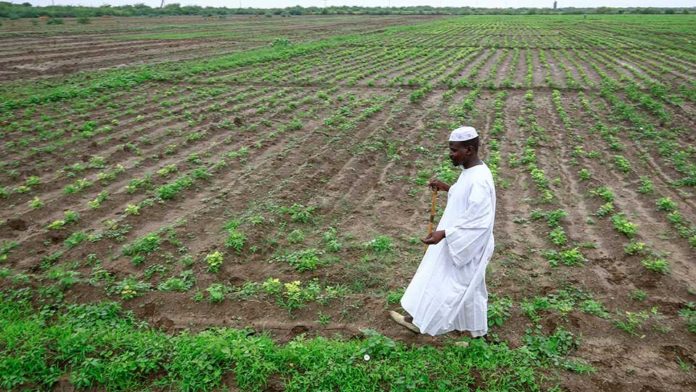
Africa was already facing food insecurity and agricultural underdevelopment prior to COVID-19. In 2018 studies showed that Sub-Saharan Africa was the world’s most food-insecure region, hosting 239 million undernourished population. Although many African countries are proactive in boosting agricultural production and protecting their food supply by raising crop productivity and reducing their sensitivity to weather conditions, it is clear that COVID-19 will derail these processes.
The impact of COVID-19 on food security and nutrition is likely to be severe, especially in African countries that were already under strain due to conflict, natural disasters, and hosting a large number of refugees. Additionally, lockdown measures and trade restrictions imposed to control the COVID-19 pandemic and ongoing locust infestation will intensify food shortage across the continent. The combination of the locust infestation and COVID-19 could wipe out any hope of food security and put the lives of entire populations at prolonged starvation and death if urgent action is not taken to deal with the situation.
The burden of movement restrictions and lockdowns is being felt strongly by low-income households and those working in the informal economy due to their loss of livelihoods and inability to access markets. Some countries have already announced measures to mitigate some of the risks of lockdowns on food supply such as in-kind food distribution and to the issuance of COVID -19 certificates for cross-border truck drivers in East Africa to ensure the safe delivery of essential goods.
A country-wide curfew in Kenya and restriction of movement in and out of counties with high infection rates posed a great challenge to smallholder farmers in terms of high transportation finding alternative markets for their produce. It is predicted that these restrictions might hike food prices and disrupt agricultural supply as witnessed during the Ebola crisis in West Africa in 2014. In major African cities, millions of people have been left without the income to purchase food due to the abrupt loss of jobs that often provide daily earnings. In rural areas where agriculture is the main source of people’s livelihoods, disruptions to transportation and logistics have made it difficult for producers to sell their produce and to gain access to agro-veterinary inputs and services.
National policy responses to limit the impact of COVID-19 on food markets in Africa have varied, from the removal of value-added taxes on food products to export restrictions on key food items. For example, on 26 March, Kenya reduced the value-added tax on all goods from 16% to 14%. Sudan introduced a ban on sorghum exports on 15 April to ensure domestic availability. Export restriction policies and hoarding short-circuit trade and distribution, thus exacerbating the risks of food insecurity, especially for the continent’s most vulnerable populations such as women and children. Administrative restrictions imposed by governments, such as lockdowns, travel restrictions and physical distancing measures have also worsened the risk of food insecurity.
China’s Agricultural Engagement Priorities in Africa Pre-COVID-19
China’s participation in African agricultural development has a long history. Over the past 60 years, China has offered grants to provide practical agricultural technology, and train agricultural technical and managerial personnel for Africa, provided loans to support agricultural infrastructure, and gradually shifted focus to agricultural trade and investment in Africa.
The recent first Forum on China-Africa Cooperation in Agriculture held before the COVID-19 pandemic had again underlined China’s strategy to Africa on agricultural development. As expected, Xinhua headlined China, Africa for broader agricultural cooperation. Key approaches to achieve broader agricultural cooperation are trade and training and boosting agricultural modernization.
The key approaches can also be traced back to the Forum on China-Africa Cooperation (FOCAC) in 2018, in which the two parties jointly issued Forum on China-Africa Cooperation Beijing Action Plan (2019-2021). The document outlined key areas for China’s participation in African agricultural development under section 3.1 Agriculture, Food Security, and Food Safety, aiming to achieve improved food security, enhanced capacity building, improved value chain, expanded trade, agriculture modernization, and research development in Africa.
China promised to provide RMB 1 billion of emergency humanitarian food assistance to African countries affected by natural disasters. Other actions were pledged to enhance the capacity of agribusiness entrepreneurs and farmers, improved value chain through increased production, high-tech agro-processing, and market access to regional and international markets. Interestingly, China highlighted two commodities, sugar and cotton. Supporting Africa’s agricultural modernization is another area of focus. China desires to help Africa upgrade the industry and agricultural infrastructure and plans to invest in testing and adaptation of machines to African conditions.
A total of US$30 billion financial packages were promised by China to cover its overall cooperation with Africa, the agricultural sector is one of the key areas. The financial package includes US$20 billion of credit lines and the setting up of a US$10 billion special fund for development financing.
However, the COVID-19 pandemic has inevitably disrupted the trade of global and regional agricultural products, exchange visits between China and Agricultural professional, and even the construction of agricultural demonstration sites. China’s expectation to promote shared prosperity and support Africa in achieving general food security by 2030 will be challenged.
Since COVID-19 hit the continent in April, China has been at the forefront of supporting several African countries by providing immediate technical and material support such as personal protective equipment (PPE), ventilators, and testing kits. Two months later, President Xi demonstrated China’s determination to jointly fight against COVID-19 with Africa and expressed China’s commitment to promoting the unshakable China-African friendship and upholding multilateralism in a keynote speech entitled “Defeating COVID-19 With Solidarity and Cooperation at the Extraordinary China-Africa Summit on Solidarity Against COVID-19” held on June 17th. Debt relief for Africa was also discussed in the summit, though China prefers to address debt issues bilaterally but indeed calls for the international community to consider debt relief for Africa to unlock finance in response to COVID-19.
On the African side, recent estimates suggest that 73 million people are acutely food insecure in Africa. The UN says the continent needs to raise more than US$100 billion to address the economic and health impact of COVID-19. The immediate question posed to China is how to support African in ensuring food security in the post-COVID-19.
POST-COVID-19: 5 Ways China Can Enhance Its Agricultural Engagement in Africa
In the age of post-covid-19, it is important to build resilience and take radical measures to develop sustainable food systems that can address various negative influences beyond providing adequate food, including on public health, youth employment, education, economic development, and social well-being. In order to address the numerous food security posed by COVID -19, below are a recommendation for China’s participation in African agricultural development
1. Early Warning Systems Support.
There is no inadequate Early Warning Systems (ESW) due to lack of qualified professionals such as meteorologists and agro-meteorologists; weak institutional and capacity and limited investment at the national and regional levels in most African countries. Additionally, meteorological and hydrological capacities in many are inadequate and degrease, according to the Sendai Framework for Disaster Risk Reduction (SFDRR). To increase the availability of disaster risk information, countries should invest in EWSs which will in turn contribute to the achievement of Sustainable Development Goals (SDGs). There is a need to increase coverage of the weather observation networks through Africa – China cooperation to make agrometeorology data more reliable. Most EWS in Africa relies heavily on project-based international financial assistance which are not sustainable, when giving Agricultural financial assistance, China should consider EWS as part of regular development because the EWS data are essential for planning interventions. A number of Chinese private companies can initiate public-private partnerships in the area of EWS which is currently very limited, such partnerships will reduce donor reliance among African countries in addressing food security. Through collaborations with SSTC collaboration with China, African countries can develop and strengthen Food security information systems at the national and regional levels, this will improve EWS effectiveness and emergency response. A good food security information system will strengthen the data-sharing framework and act as a one-stop food security information hub accessible to different stakeholders such as the international community and government agencies.
2. Social Protection Through SSTC Aid and Grants.
Researchers posited that social protection can be a good tool to enhance food security in Africa, through social protection policy interventions vulnerability of individuals and communities can be reduced both in the short and long term. It is predicted that COVID -19 shocks might affect food availability, access, and use appropriate social protection intervention will enable marginalized communities to access social justice and prevent chronic poverty. With proper preparation, the depth and implications of the suffering can be reduced through policies such as public works (including food-for-work- and cash-for-work programs); food aid; subsidies; and the use of social funds.
China’s grants and aid to African countries focus on ensuring that the poor do not lose access to social services. The target group for such policies should be the most vulnerable members within the household (children, women, the elderly, and the sick) should be shielded from bearing the brunt of the adjustment”. Through SSTC knowledge sharing and peer learning, China can support different countries to protect households against shocks to reduce poverty, hunger, and under-nutrition. If well implemented and coordinated, social protection can increase agricultural growth in Africa, both directly and indirectly. A holistic approach is important to address food security by strengthening coordination between social protection, social services, and productive sectors.
3. Enhanced Production Capacities.
In order to address the impact of COVID-19 on food security in the long term, Africa will need to build productive capacities to address underlying economic vulnerabilities, and strengthen continental capabilities to better manage food, pandemic, and/or health-related crises. In the previous decades, China has helped build agricultural technology demonstration centers (ATDCs), supplied senior agricultural experts and technicians, and imparted best practices in management and practical techniques in agricultural production in Africa. The exchanges and training on modern agricultural technologies are still key to enhance production capacities in Africa. The activities could be still carried out in virtual formats such as a webinar, online courses, mentoring programs in today’s pandemic situation.
Another area of focus is youth-target and women-specific entrepreneurship training and promotion, where the Chinese private sector could act as mentors. The Africa Union says nearly 20 million jobs in Africa will be threatened by the COVID-19 crisis, with youth unemployment twice that of adults. Women, consisting of 50% of agriculture labor in sub-Saharan, are essential for fighting against hunger and COVID-19 crisis. China has accumulated vast experience in promoting SMEs in rural areas, especially the youth-oriented, women-inclusive e-commerce, and value chain development led by private sectors including giant Tech Alibaba, JD.Co, Tiktok. The private sectors in China, if facilitated by the governments, have the potential to be trainers or teachers for SMEs in Africa. One great example is the eFounders Fellowship Initiative funded by Alibaba Business School and UNCTAD, and the associated Netpreneur Prize to support exemplary African business leaders.
4. Rural Infrastructure as a Key To Boost Agricultural Development.
According to experts, China-Africa cooperation is key to boosting COVID-19 response and industrial growth. Agricultural development in the continent is hampered by lack of infrastructure, poor irrigation system, and value chain system, intricate local politics. China has prioritized investing in infrastructure in its strategic cooperation framework with Africa, but many investment projects centered on manufacturing. To realize food security in a post-COVID-19 era in Africa, it is vitally important to improve the infrastructure (roads, transport, warehouses, farms, agricultural extension centers) along the development stages of the agricultural value chain.
5. Embrace Digitization Throughout the Value Chain.
It is widely acknowledged that COVID-19 accelerated digital adoption worldwide, ranging from health information dissemination, data collection, e-commerce, to teleworking. Agricultural experts suggest that African countries should create digital data rooms to track and forecast food availability, pricing, and accessibility, both during and after the crisis. It could track trade flows, food pricing at the retail level, and availability at food shops in urban and rural areas. Digital transformation for African agriculture value chains is also highlighted.
China has comparative advantages in terms of digital infrastructure, technology and the established e-commerce model. In the post-COVID-19 era, China is in a good position to support efforts to speed up the development of Africa’s digital economy and expand exchanges and cooperation on digitalization, information, and communication technologies, especially telemedicine, tele-education, 5G, and big data.
To sum up, African countries can benefit from the advancement of China’s technology, experience, and knowledge of agricultural development to curb food security in the post-covid-19. South-South and Triangular Cooperation can be a great mechanism to accelerate China’s contribution to the sustainable food system in Africa.
Source; chinaafricaproject.com







